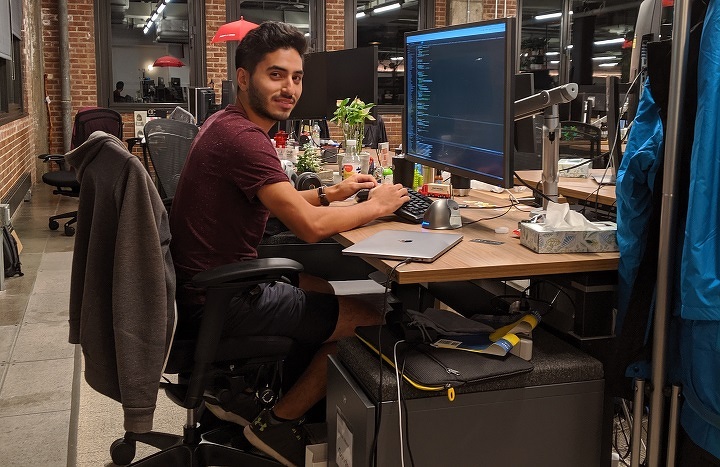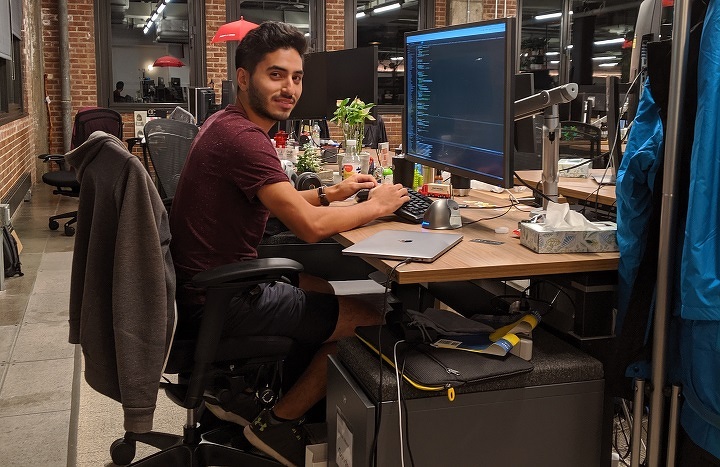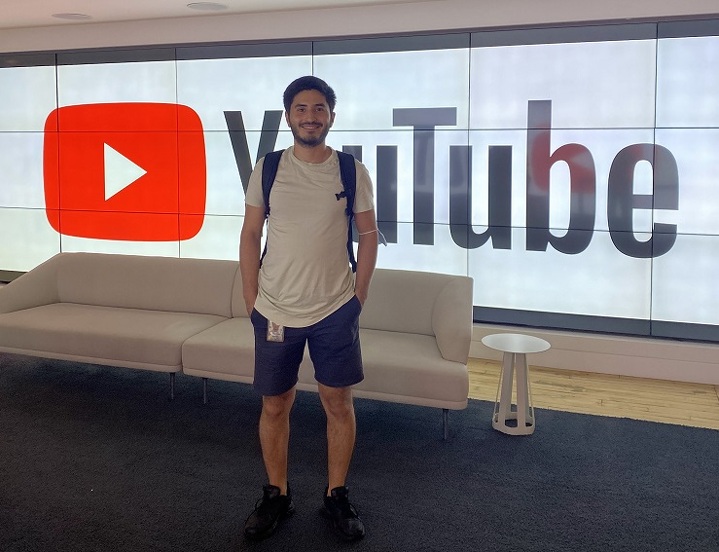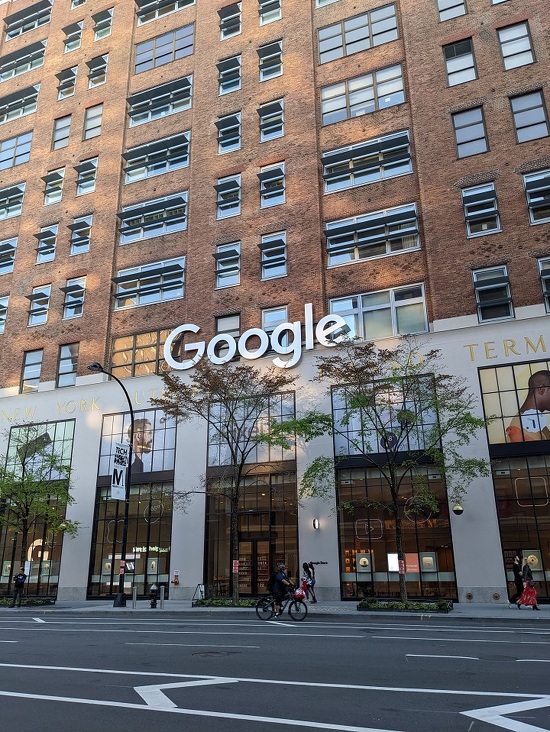
Google has about a hundred employees from Kazakhstan. They even have their own community officially recognized by the management. Sherzat Aitbayev, one of the developers of Google Checks, told us how Kazakhs get this “dream job”, why they quit and why they stay.
Sherzat was born in the Uzbek city of Almalyk. When he was 9 years old, his family moved to Almaty. He studied at the Kazakh-Turkish Lyceum where he attended a programming group to be trained for IT olympiads. Since high school, Sherzat won prizes at city and republican competitions. With his team he won silver at the All-Russian Olympiad and gold at the Eurasian Olympiad. School achievements in computer science helped him a lot when entering a university in the United States.
- “I found out that my classmates are taking exams in the North American University (NAU). I got interested, and I also applied. My family and I did not even consider studying in America, but it turned out that NAU offered very good discounts on tuition fees, about 80%. NAU was a new university and was attracting foreign students,” Sherzat explains.
His parents struggled to afford tuition and living expenses in America, so Sherzat almost immediately went to find paid internships. From the second year up he paid his own expenses.
When asked about his knowledge of English, he says that his academic English was good. The lyceum taught technical subjects in English, and he passed IELTS.
“But when I came to America, I did not understand nearly anything,” he smiles. “It got better after a couple of months.

Before his fourth year in university, Sherzat completed an internship at Amazon, sent out a CV with his solid track record, and by the end of his studies received job offers from Amazon, Twitter and Google.
- “I decided to choose Google, and just three weeks after my graduation I began working there,” Sherzat says. He further explains, “Ever since I was in school, Google has been my dream. And when I was a university student, The Internship came out. Plus, Google was in Silicon Valley, where I wanted to live and see what was up. The last thing was the salary – they offered me better pay”.
Sherzat says the process of applying for a job was “classic” – “a bunch of technical interviews where you had to solve problems.”
“I started working at Google in 2016 and have so far worked in Firebase, YouTube and Checks teams. I got a chance to live in Mountain View, London and New York (where I live now). It’s been almost seven years since started working at Google, and over this time, the people I work with have become much more important than the company itself,” he admits. “At Google, you can change the teams you work for. If you didn’t like it or if you want to try something else, you can find positions in other teams on the internal website. I'm on my third team now.”

Of the six classmates who went to the North American University, one transferred to South Korea, three returned to Kazakhstan after graduating from NAU and are now working in different fields, including education, investment, and business; two remained abroad.
- “Ramazan Ushpayev graduated with a degree in Business Administration, but he later retrained in tech and now works at NASA. Madi Khamitbekov went to Canada and got a job at Amazon,” Sherzat talks about the success of his friends.
“About 100 Kazakh citizens work in various Google offices, from Taiwan to California,” says Sherzat. “They work mostly in software.”
“I would say that for many of us, including myself, this was once a dream job. However, by working here, people expand their industrial horizons and begin to understand what they really want to do with their career. Eventually, many people naturally move from these dream jobs to the next stages. There are guys who leave to work for other companies,” says Sherzat. “My friend, Malika Aubakirova, used to be a senior developer at Google. She decided to leave and get an MBA from Stanford University, thus, radically changing her career from technology to business,” Sherzat explains. A lot of people move between the global corporations, like Google, Meta, Amazon, etc.

Sherzat himself likes working at Google. He shudders recalling a mass layoff - on January 20, 2023, the CEO of Google and its parent company Alphabet, Sundar Pichai, in a letter to employees announced plans to lay off about 12 thousand people.
“I woke up and reflexively checked my personal email and then my corporate email when saw a letter from our CEO about layoffs. Many assumed that this would also affect our company, but no one expected that it would be so out of the blue,” Sherzat shrugs his shoulders. “Laid-off employees lost access to all work resources, including mail, in the middle of the night. There was no chance to exchange contacts or to say proper goodbyes to their colleagues. Although this is understandable, it is still a shame that layoffs happened that way. Many of my colleagues were affected. As far as I know, only a few Kazakhs were laid off. Thankfully, the severance pay was very generous”.
Kazakh Googlers try to keep in touch, as Sherzat Aitbayev notes. The corporation has its own Kazakh “diaspora”.
“My friend Aida Zhumabekova, software engineer at Google, and I are the leaders of the Kazakh community in the company. We promote many initiatives to support the community, we strive to help Kazakhs both professionally – to move up the career ladder, and socially – so that people could get to know each other and be aware that there are their compatriots in the company,” Sherzat explains.
The second goal of the community is to raise awareness about Kazakhstan and its culture.
“Recently, in March, we celebrated Nauryz in California,” says Sherzat. Together with Iranian and Afghan Googlers, they organized a celebration with refreshments, costumes, and music. One of the Kazakh colleagues, Zhassan Baipakbayev, played the dombyra. Americans got very interested; many did not know that such a holiday is also celebrated in Central Asia.
Sherzat Aitbayev has been working on Google Checks for four years now. Google Checks is a privacy platform for mobile app developers that helps build a more secure digital ecosystem by making it easier for development teams and apps to maintain privacy.
- “There are now many legal restrictions related to data protection and how this data can be shared. We help companies with mobile applications to simplify their privacy-related processes and reduce the risks of violating relevant laws,” Sherzat explains.
The team Sherzat works with participated in Area 120 and Google Labs, Google's internal experimental departments, sort of like a startup incubator.
- “We started this project in April 2020; I was the first software engineer there. Now, we have graduated from the incubator and are part of the “core” Google. Last year, we launched the beta, and since then the demand for our product has been increasing every week,” he rejoices. “Our goal is to make the entire privacy system more secure for both users and companies. Basically, we have the opportunity to create a product that will solve the problem on a global level, and in the end everyone will benefit.”
It is evident that Sherzat really enjoys his current work, and he plans to stay at Google in the nearest future.
“In the course of my career, I realized that the crucial part of the work is the people that you work with. I am lucky because I had the opportunity to work with such talented and close-knit team. We have great plans for the rest of 2023 and 2024,” states Sherzat.
“But I still do not know for sure what I will do in a few years,” he then continues. “I really enjoy working on projects from scratch. Whether it's at Google or not, I want to keep doing that in the future. But, of course, having gained a lot of experience in big tech, I want to try my hand at the outside startup world.”